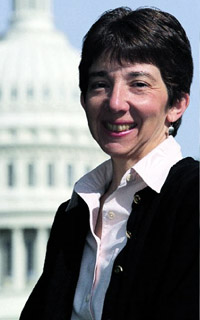Photo: Michael Di Bari

Standing Up for Workers
UCSC economist Lori Kletzer has coauthored a compelling proposal to help workers who lose their jobs through no fault of their own
If the U.S. is to recapture its leadership role promoting international trade liberalization, advocates of free trade must address widespread public concern about job loss.
As activists take the debate over free trade into the streets of Seattle, Washington, D.C., and Quebec, UCSC economist Lori Kletzer is acknowledging a fact that few proponents of free trade admit publicly: As we move into a globally integrated international economy, some people will lose their jobs.Kletzer is an advocate of further trade liberalization but only when it is accompanied by measures that address the costs borne by some workers. "We need more support for workers who lose their jobs, especially those who take a pay cut on their next job," she says.
Watching people lose their jobs to trade, technology, and downsizing prompted Kletzer to tackle the painful subject of U.S. worker dislocations during a recent stint as a visiting fellow at the Institute for International Economics (IIE). The result is a compelling proposal to provide up to two years of financial help to workers who lose their jobs through no fault of their own and who go on to get a new job that pays less than their previous job. Called wage insurance, the proposal recognizes that the emerging global economy has negative effects on some workers, and it broadens the safety net to include workers who have been dislocated for any reason.
Coauthored with Robert E. Litan, vice president and director of the Economic Studies Program at the Brookings Institution, Kletzer's paper has attracted support from a broad spectrum of government policy makers, free-trade proponents, and commentators, including Carla A. Hills, the United States Trade Representative who served under then-President George Bush. Even Alan Greenspan has expressed interest in the idea.
"Trade liberalization is a focal point for anxiety about American jobs, and public opinion reflects that," says Kletzer, referring to a poll by the Pew Research Center for People and the Press that found that 78 percent of respondents said "protecting the jobs of American workers" should be the top priority in shaping U.S. trade policy.
If the U.S. is to recapture its leadership role promoting international trade liberalization, advocates of free trade must address this widespread public concern about job loss, says Kletzer, an associate professor of economics at UCSC. The policy brief, "A Prescription to Relieve Worker Anxiety," was published simultaneously in March by IIE and the Brookings Institution.
"The benefits of free trade are clear, but proponents of free trade have failed to acknowledge that as we move into a globally integrated international economy, some people will lose their jobs," says Kletzer.
Trade-related job losses are concentrated in manufacturing industries where import competition is strong, including the automobile, steel, textile, apparel, computing, and electronics industries. But the loss of any manufacturing job is costly: Displaced manufacturing workers suffer an average 17 percent drop in wages when they become reemployed, says Kletzer.
"That's a lot," says Kletzer, but the average 17 percent drop obscures two even more compelling figures: Thirty-four percent of displaced manufacturing workers earn as much or more on their new job, while 25 percent experience reemployment earnings losses of 30 percent or more.
"What I found is that some workers do okay, and an equal number just take it on the chin," notes Kletzer. "So I'm saying, let's not worry about those who do as well or better. Let's concentrate on the ones who are suffering. This proposal fills a policy gap by helping workers after they get a new job."
The idea of wage insurance has been around for about 15 years, but Kletzer is the first economist who has analyzed displacement figures and identified the relatively small portion of workers who experience the greatest need for assistance. That finding enabled Kletzer and Litan to conclude that a wage insurance program tailored to serve those workers would cost much less than expected: If workers received 50 percent of their earnings loss, the program would cost from $2.9 billion to $3.8 billion a year, depending on maximum annual assistance levels.
Key elements of the Kletzer-Litan proposal are as follows:
![]() Workers would receive no benefits until they begin a new job.
Workers would receive no benefits until they begin a new job.
![]() Benefits could range from 30 percent to 70 percent of the total reemployment earnings loss.
Benefits could range from 30 percent to 70 percent of the total reemployment earnings loss.
![]() Benefits would not exceed an annual cap for each worker.
Benefits would not exceed an annual cap for each worker.
![]() To be eligible, workers must have been displaced from a full-time job they had held for a minimum of two years.
To be eligible, workers must have been displaced from a full-time job they had held for a minimum of two years.
Although some people oppose the proposal on the grounds that it would create a new government program, many policy makers and pundits recognize that efforts to promote free trade have stalled since massive public protests disrupted the World Trade Organization's meeting in Seattle in December 1999.
Referring to the lost momentum on trade policy, Washington Post columnist David S. Broder wrote that Kletzer and Litan's proposal "hints at the kind of open-mindedness that will be needed to build broader political support for free trade."
Kletzer wants to broaden the scope of the discussion. "Refusing to acknowledge the costs of free trade is simply untenable," she says. "The politics of free trade require us to acknowledge that there are costs. We have to move to a more balanced dialogue."
--Jennifer McNulty
The brief is available on the web at 207.238.152.36/policybriefs/NEWS01-2.HTM